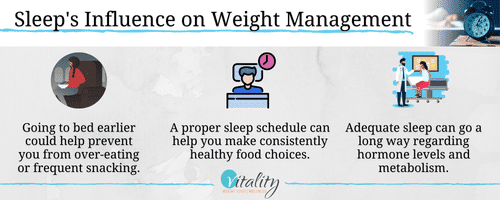When you’re eating a well-balanced diet and find yourself participating in various cardiovascular and strength training activities, not seeing the scale numbers drop down over a sustained period can be perplexing at best and outright frustrating at worst.
When you’re eating a well-balanced diet and find yourself participating in various cardiovascular and strength training activities, not seeing the scale numbers drop down over a sustained period can be perplexing at best and outright frustrating at worst. After all, proper eating habits and a regular exercise schedule should equate to weight loss…right?
In most cases, the answer is yes. However, there’s another vital consideration to weight loss success you may not be taking into account: sleep. On average, adults who get at minimum seven to nine hours of sleep each night are more likely to lose weight.
How Can Proper Sleep Help With Weight Loss?
Before we get into the details of how sleep can influence your weight, it’s important to remember that tweaking your bedtime won’t allow you to eat whatever you want and wake up the following morning magically several pounds lighter. Although, there are ways that the structure of sleep, and what it does to the body, can impact your energy levels and behavior — factors that directly contribute to your weight management journey.
Healthier Eating Choices
Ask yourself about when you do most of your snacking. While you may have a bit of food to hold you over between lunch and dinner, if you’re like most people, it takes place at night. Even more specifically, soon before you head to bed.
At this time of day, we don’t usually snack because we are actually hungry, but rather because we’re looking for a tasty way to pass the time, or we want something to keep us occupied during our movie and television-watching hours.
Unless you’re primarily going for veggies each time you get an off-hours craving, these snacks are hardly healthy choices. Secondly, when we choose to eat junk food later in the evening, we don’t give our bodies enough time to digest the food and burn off the calories that come with it. We just snack and sleep — not the best combo for weight loss.
Increase In Metabolism
Metabolism works to break down and process the calories you consume daily. The faster it is, the better your chances of successful weight loss. There are ways to boost it, including proper exercise and eating nutritious foods such as egg whites, lean meat, water, and — you guessed it — getting a good night’s sleep.
Sleep deprivation can result in complications with your hormones as well as cortisol and blood sugar levels. Essentially, this means it will be more difficult for your body to retain muscle and burn fat and calories, contributing to your weight gain.
For more information about our weight management resources, including our weight loss program and nutrition counseling, reach out to our team today.





